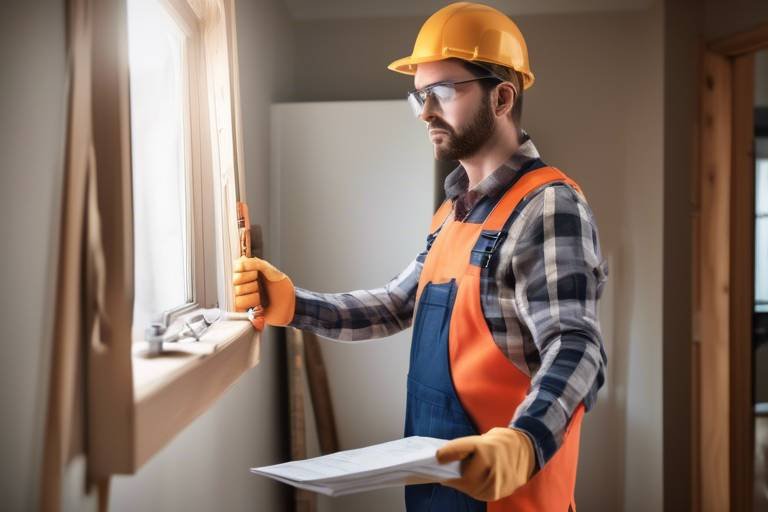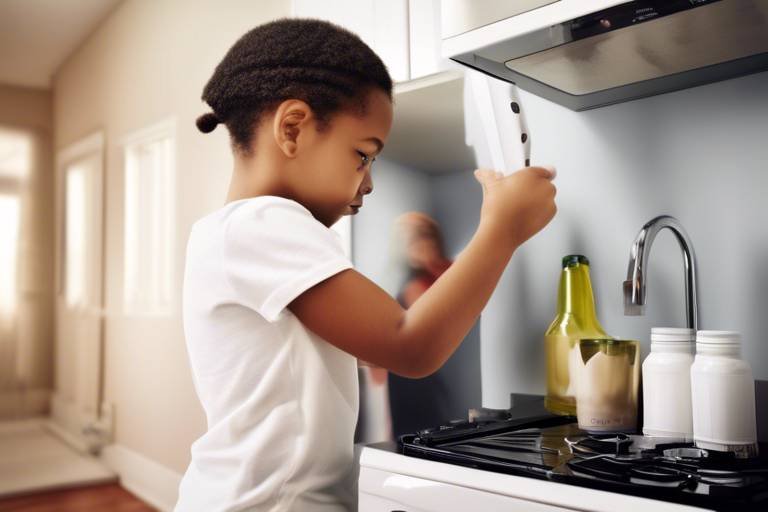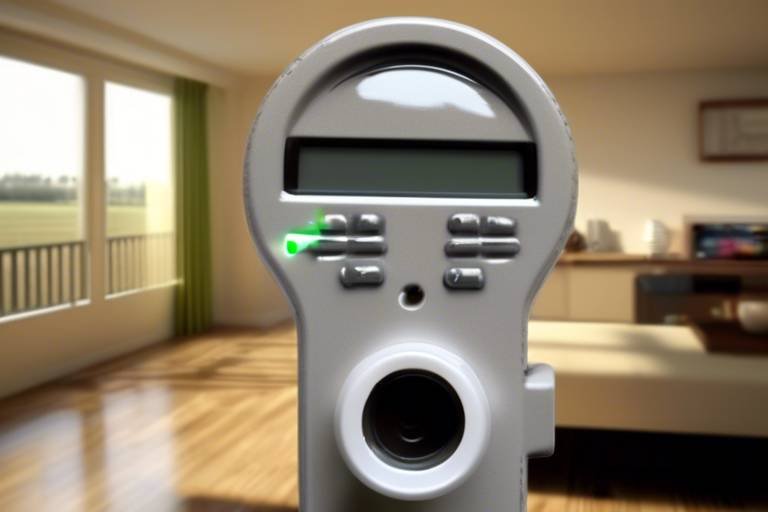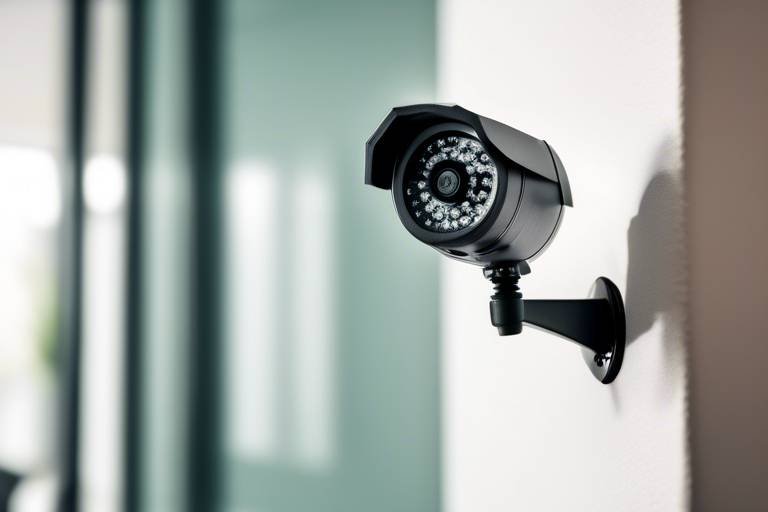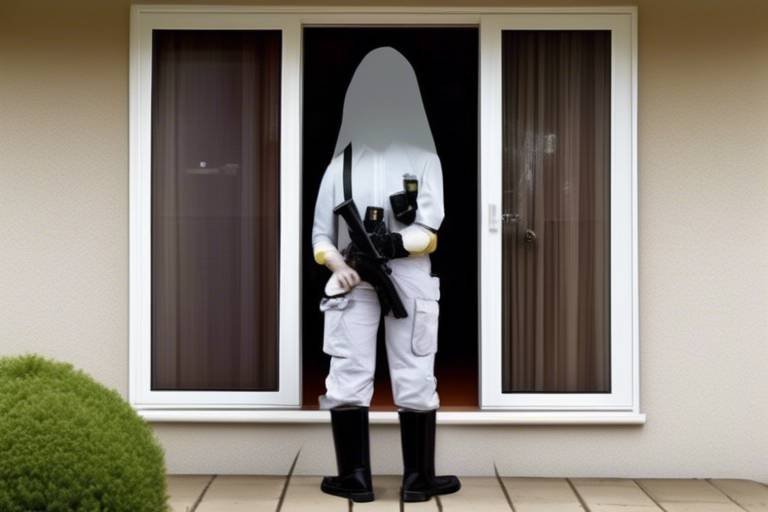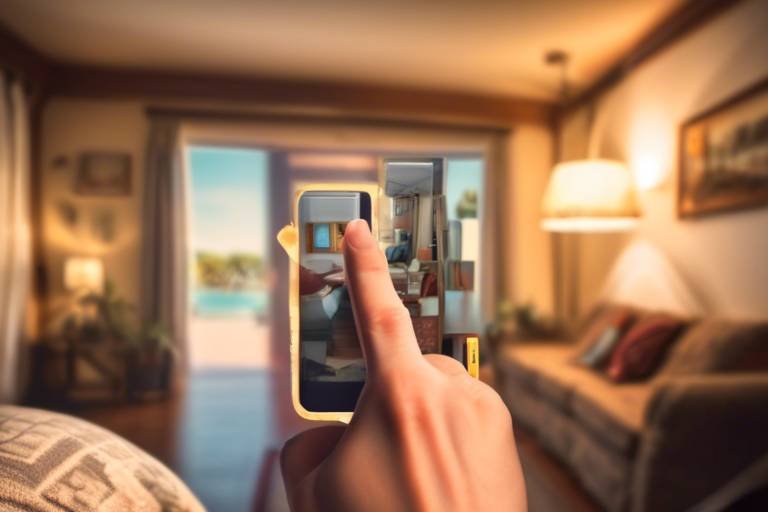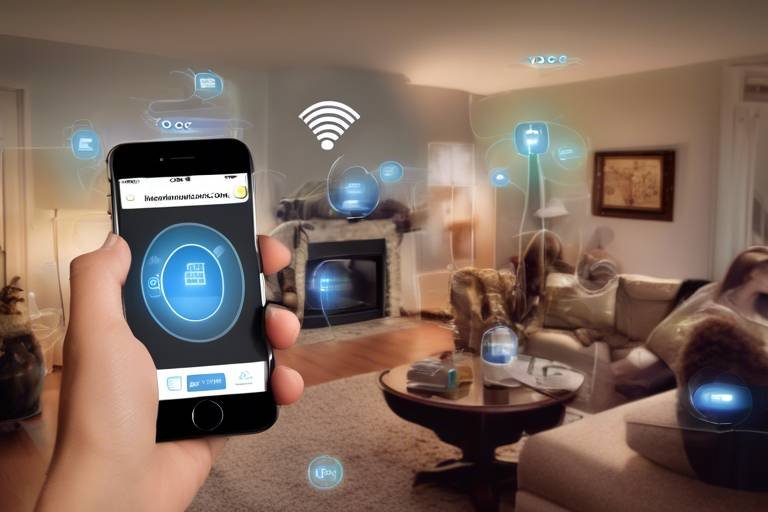Are Smart Locks Worth the Investment for Home Security?
When it comes to securing our homes, we all want the best protection possible. In today's digital age, smart locks have emerged as a popular alternative to traditional locking mechanisms. But are they really worth the investment? In this article, we'll dive deep into the advantages and disadvantages of smart locks, explore their features, installation processes, and assess their overall effectiveness in enhancing home security compared to conventional locks.
Smart locks are electronic locking devices that offer keyless entry, remote access, and a variety of enhanced security features. Imagine walking up to your door with your hands full of groceries and being able to unlock it with just a tap on your smartphone. That's the kind of convenience smart locks bring to the table. They operate using various technologies such as Bluetooth, Wi-Fi, or even biometric recognition, making them a high-tech solution for modern homeowners. This section will delve into how they function and the technology behind them.
Smart locks provide numerous benefits that can make them an attractive option for homeowners. From convenience to improved security, these devices are designed to enhance your daily life. Here are some key advantages that make them appealing:
One of the primary benefits of smart locks is their convenience. Users can unlock their doors remotely, grant access to guests, and monitor entry points from anywhere, enhancing overall accessibility. Imagine being at work and realizing you forgot to lock your door; with a smart lock, you can secure your home with just a few taps on your phone.
Many smart locks come with mobile apps that allow homeowners to control their locks from a distance. This feature is particularly useful for managing access while away from home. Whether you're on vacation or just out for the evening, you can check if your door is locked and even let in a friend or family member without needing to be there in person.
Smart locks often allow users to create temporary access codes for guests or service providers. This ensures security without the need to hand over physical keys. For instance, if you have a dog walker or a maintenance worker coming by, you can generate a code that only works for a specific time frame. This feature adds a layer of convenience while maintaining security.
Smart locks can integrate seamlessly with other smart home devices, such as security cameras and alarms. This integration enhances overall home security by allowing you to monitor your home in real-time. For example, if your smart lock detects that someone has entered your home, it can send an alert to your smartphone, and if integrated with a camera, you can see who it was. The ability to connect these devices creates a comprehensive security system that traditional locks simply can't match.
Despite their benefits, smart locks also come with potential drawbacks that homeowners should consider. These include reliance on technology, battery life concerns, and vulnerability to hacking. Understanding these issues is crucial for homeowners considering the investment.
Smart locks depend on Wi-Fi or Bluetooth connectivity, which can be a concern during power outages or network failures. If your home loses power or your internet goes down, you might find yourself locked out. Understanding these limitations is crucial for homeowners considering the investment. It's essential to have a backup plan, like a physical key, just in case.
Smart locks require batteries for operation, and users must regularly check and replace them. This section discusses the importance of maintenance for ensuring reliable performance. While many smart locks alert you when the battery is low, it's still a good idea to check regularly to avoid any unpleasant surprises, like being unable to get in after a long day.
When deciding whether to invest in a smart lock, it's important to compare them to traditional locks. Understanding the key differences in security features, convenience, and cost can help homeowners make informed decisions.
Smart locks often include advanced security features such as encryption and alerts, which traditional locks lack. For example, many smart locks can notify you if someone tries to tamper with them. This comparison helps homeowners assess the effectiveness of each option and decide which best fits their needs.
While smart locks may have a higher upfront cost, their long-term benefits can outweigh the initial investment. This section provides a detailed cost analysis for homeowners to consider. When you factor in the convenience, security features, and potential savings on home insurance, smart locks can be a smart financial decision in the long run.
- How secure are smart locks compared to traditional locks? Smart locks often provide enhanced security features, such as encryption and tamper alerts, making them more secure in many cases.
- What happens if the battery dies? Most smart locks have a backup key option or alert you when the battery is low, so you can replace it before it dies.
- Can I still use a physical key with a smart lock? Many smart locks offer the option to use a physical key in addition to the smart features.
- Are smart locks easy to install? While some may require professional installation, many smart locks are designed for easy DIY installation.

Understanding Smart Locks
Smart locks are revolutionizing the way we think about home security. Gone are the days of fumbling for keys at the front door or worrying about losing them. Instead, smart locks offer a blend of technology and convenience, allowing homeowners to control their locks from their smartphones or other devices. But how do they actually work? At their core, smart locks utilize electronic mechanisms that can be operated via Bluetooth, Wi-Fi, or Z-Wave technology. This means you can lock or unlock your door from virtually anywhere, provided you have an internet connection.
What sets smart locks apart from traditional locks? Well, most smart locks come equipped with a range of features designed to enhance security and user experience. For instance, many models have built-in alarms that alert you if someone attempts to tamper with the lock. Additionally, they often include features like auto-locking, which ensures that your door locks itself after a certain period, providing an extra layer of security.
But it’s not just about locking and unlocking. Smart locks can also be integrated into broader home automation systems. This means they can work in concert with other smart devices in your home, such as security cameras, lights, and even your thermostat. Imagine arriving home after a long day, and as you approach your front door, the lights turn on, and the door unlocks automatically. This seamless integration not only enhances convenience but also provides a comprehensive security solution.
As with any technology, it’s important to understand the underlying components that make these smart locks tick. Most smart locks feature a keypad or a mobile app for entry, which can replace traditional keys. Some even allow for biometric access, such as fingerprint scanning, adding another layer of security. The technology behind these locks often includes encryption protocols to protect your data and ensure that only authorized users can gain access.
In summary, smart locks represent a significant advancement in home security technology. They offer a level of convenience and control that traditional locks simply cannot match. However, understanding how they function and the technology behind them is crucial for homeowners considering this investment. With features like remote access, integration with smart home systems, and enhanced security measures, smart locks are indeed a worthy contender in the realm of home security.

Benefits of Smart Locks
Smart locks are revolutionizing the way we think about home security, and their advantages are hard to ignore. One of the standout benefits is the incredible convenience they offer. Imagine being able to unlock your door from anywhere in the world with just a tap on your smartphone. No more fumbling for keys or worrying about losing them! This level of accessibility is especially handy for those who frequently have guests or service providers coming and going. You can simply send them a temporary access code, allowing them entry without needing to be there in person.
Another significant advantage is the improved security features that come with smart locks. Many models are equipped with advanced encryption technology, making them much harder to hack than traditional locks. In fact, some smart locks can send you real-time alerts whenever someone enters or exits your home. This means you can keep an eye on your property even when you’re miles away. If you’re someone who travels often or has a busy lifestyle, these features can provide peace of mind that traditional locks simply can’t match.
Moreover, smart locks can easily integrate with your existing smart home systems. If you already have devices like security cameras or alarms, connecting them to your smart lock can create a more cohesive security network. For instance, when your smart lock detects that you’re home, it can automatically disarm your security system. Conversely, if someone tries to unlock your door while you’re away, your cameras can start recording. This level of integration can significantly enhance your overall home security.
Let’s not forget about the energy efficiency of smart locks. Many models are designed to consume minimal power, and some even come with energy-saving modes. This means you won’t have to constantly worry about changing batteries or running up your electricity bill. Plus, the ability to monitor your lock’s battery life through a mobile app ensures that you’ll never be caught off guard by a dead battery.
In summary, the benefits of smart locks extend beyond mere convenience. They offer enhanced security, seamless integration with other smart devices, and energy efficiency. The world is moving towards a more connected lifestyle, and investing in a smart lock is a step towards making your home not just a place to live, but a secure sanctuary.

Convenience and Accessibility
When it comes to home security, convenience and accessibility are two critical factors that can significantly enhance your experience as a homeowner. Imagine being able to unlock your door without fumbling for keys in your pocket while juggling groceries or trying to keep your kids from running out into the street. Smart locks make this scenario a reality by offering a seamless keyless entry system that can be operated with just a tap on your smartphone or a simple voice command.
One of the standout features of smart locks is their ability to grant access remotely. This means that whether you're at work, on vacation, or just lounging on the couch, you can control who enters your home. For example, if a friend stops by unexpectedly or a delivery person needs to drop off a package, you can unlock the door from anywhere, ensuring that you never miss an important visitor. The convenience doesn't stop there; many smart locks also allow you to monitor entry points in real-time. You can receive alerts whenever someone enters or exits your home, providing an extra layer of security and peace of mind.
Another significant advantage of smart locks is the ability to create temporary access codes. This feature is perfect for situations where you want to allow guests or service providers access without giving them a physical key. You can set up a unique code that works for a limited time, such as during a scheduled visit from a cleaning service or for a friend's weekend stay. Once the time is up, the code becomes invalid, ensuring that your home remains secure without the hassle of key exchanges.
To illustrate how smart locks enhance convenience, consider the following benefits:
- Remote Unlocking: Unlock your door from anywhere using a mobile app.
- Temporary Codes: Easily create and manage access codes for guests and service providers.
- Real-Time Monitoring: Get notifications whenever someone enters or exits your home.
In a world where technology is constantly evolving, having a smart lock can make your life easier and more secure. It’s like having a personal doorman who never sleeps—always ready to grant access to those you trust while keeping unwanted guests at bay. With smart locks, the days of worrying about lost keys or forgetting to lock the door are over. You can enjoy the freedom and peace of mind that comes with knowing your home is secure and accessible at all times.

Remote Access Features
Imagine being able to unlock your front door without even being home. Sounds like something out of a sci-fi movie, right? Well, with smart locks, this is now a reality! One of the standout features of smart locks is their remote access capability. This means that you can control your locks from anywhere in the world, as long as you have an internet connection. Whether you're at work, on vacation, or just lounging on your couch, the power to manage your home’s security is literally at your fingertips.
Most smart locks come equipped with a dedicated mobile app that allows homeowners to perform various functions remotely. With just a few taps on your smartphone, you can lock or unlock your doors, check their status, and even receive notifications whenever someone enters or exits your home. This feature is particularly beneficial for those who frequently have guests, service providers, or family members coming and going. Instead of worrying about whether you left the door unlocked, you can simply check the app to put your mind at ease.
Additionally, many smart locks allow you to grant temporary access codes to visitors. This is a game-changer for homeowners who want to provide access without the hassle of physical keys. For example, if a friend is stopping by while you're away, you can create a unique code that works for a limited time. This way, you maintain security without compromising convenience. Imagine the ease of letting in a delivery person or a maintenance worker without needing to be physically present!
However, it's essential to note that while remote access features offer incredible convenience, they also require a stable internet connection. If your Wi-Fi goes down or if there’s a power outage, you might find yourself locked out of your own home—or worse, unable to lock it securely. Therefore, it's wise to have a backup plan in place, such as a traditional key or a secondary locking mechanism, just in case technology fails you.
In summary, the remote access features of smart locks significantly enhance home security and convenience. They allow homeowners to manage their locks from anywhere, provide temporary access codes for guests, and keep tabs on who enters and exits their home. The blend of technology and security not only makes life easier but also gives peace of mind. So, if you’re considering upgrading your home security, these features are definitely something to take into account!
- What happens if the battery dies on a smart lock? Most smart locks have a backup key option or low-battery alerts to ensure you can still access your home.
- Can I use my smart lock without Wi-Fi? Yes, many smart locks use Bluetooth, allowing you to unlock the door directly from your smartphone without an internet connection.
- Are smart locks hackable? While no device is completely immune to hacking, reputable smart locks use advanced encryption to protect your data and access.
- How do I install a smart lock? Installation is typically straightforward and can often be done with basic tools. Many manufacturers provide step-by-step guides or video tutorials.

Temporary Access Codes
One of the standout features of smart locks is the ability to create . This functionality is a game changer for homeowners who frequently have guests or service providers entering their homes. Imagine this: you have a friend visiting, but you can’t be there to let them in. Instead of fumbling with spare keys or worrying about giving them a permanent key, you can simply send them a unique access code that expires after a set time. This level of control not only enhances your convenience but also significantly boosts your home’s security.
Temporary access codes work by allowing you to generate a code through the smart lock’s mobile app. You can specify how long the code will remain active, which means you can create codes for:
- House sitters
- Cleaning services
- Delivery personnel
This feature ensures that you maintain full control over who has access to your home and when. No more worrying about whether a key might fall into the wrong hands or if someone might forget to return it after using it. With temporary codes, you can simply delete the code after the visit, ensuring that access is tightly managed.
Moreover, many smart locks allow you to monitor when these codes are used. You can receive notifications on your smartphone each time a code is entered, giving you peace of mind and the ability to track who is coming and going. This feature is particularly useful for families with children, as parents can keep tabs on who is entering the home and at what times.
In essence, temporary access codes not only enhance the convenience of managing home access but also bolster security by ensuring that access is limited and monitored. It’s a modern solution to an age-old problem, making it an appealing feature for anyone considering a smart lock.
Q: Can I create multiple temporary access codes for different people?
A: Yes, most smart locks allow you to create multiple temporary access codes, each with its own expiration settings.
Q: What happens if I forget to set an expiration date for a temporary code?
A: If you forget to set an expiration date, the code may remain active until you manually delete it, so it’s important to manage your codes regularly.
Q: Can temporary access codes be used with all smart locks?
A: Not all smart locks have this feature, so it’s essential to check the specifications of the model you are considering.
Q: How do I delete a temporary access code?
A: You can typically delete a temporary access code through the smart lock's mobile app, allowing for easy management of access permissions.

Integration with Smart Home Systems
When it comes to modern home security, the term "smart" is more than just a buzzword; it's a game changer. Smart locks are designed to seamlessly integrate with various home automation systems, creating a cohesive ecosystem that enhances your home security and convenience. Imagine being able to control your door locks, lights, and security cameras all from a single app on your smartphone. This level of integration not only simplifies your life but also provides an added layer of safety that traditional locks simply can't offer.
One of the most appealing aspects of smart locks is their ability to communicate with other smart devices in your home. For example, when you unlock your door, your smart lights can automatically turn on, illuminating your entryway. This feature not only welcomes you home but also acts as a deterrent for potential intruders. Moreover, smart locks can be programmed to send alerts to your smartphone, notifying you when someone enters or exits your home. This real-time monitoring is invaluable, especially for families with children or elderly members who may need assistance.
Furthermore, many smart locks are compatible with popular smart home platforms such as Amazon Alexa, Google Assistant, and Apple HomeKit. This compatibility allows you to use voice commands to lock or unlock your doors, adding another layer of convenience. Just picture this: you’ve got your hands full with groceries, and instead of fumbling for your keys, you simply say, “Alexa, unlock the front door.” It's that easy!
In addition to voice control, the integration of smart locks with security cameras and alarm systems is a significant advantage. For instance, if your doorbell camera detects motion, it can trigger your smart lock to send you a notification, allowing you to assess the situation immediately. This interconnectedness not only enhances security but also provides peace of mind, knowing that you have a comprehensive system working for you.
However, it's essential to choose smart locks that are compatible with the devices you already own. Before making a purchase, consider creating a list of your existing smart home devices to ensure compatibility. Here’s a quick reference table to help you understand some popular smart home systems and their compatibility with smart locks:
| Smart Home System | Compatible Smart Locks |
|---|---|
| Amazon Alexa | August Smart Lock, Schlage Encode |
| Google Assistant | Yale Assure Lock, Kwikset SmartCode |
| Apple HomeKit | August Smart Lock Pro, Schlage Sense |
In summary, the integration of smart locks with smart home systems is a major selling point for homeowners looking to enhance their security. The ability to control multiple devices from one app, receive real-time alerts, and utilize voice commands makes smart locks not only a wise investment but also a step into the future of home automation. As technology continues to evolve, the possibilities for smart home integration will only expand, making now the perfect time to consider upgrading your home security.
Q: Are smart locks safe from hacking?
A: While no device is entirely immune to hacking, reputable smart lock brands employ encryption and security protocols to minimize risks. Regular software updates also help enhance security.
Q: What happens if the battery dies?
A: Most smart locks have backup key options or low battery alerts. It's essential to check the battery regularly to avoid lockouts.
Q: Can I integrate smart locks with my existing home security system?
A: Many smart locks are designed to work with various home security systems. Check compatibility with your existing devices before purchasing.
Q: How do I install a smart lock?
A: Installation is generally straightforward and can often be done with basic tools. Many brands provide detailed instructions or video tutorials to guide you through the process.

Potential Drawbacks of Smart Locks
While smart locks offer a multitude of advantages, it's essential to consider the potential drawbacks that come with these modern locking systems. One of the most significant concerns is their reliance on technology. Smart locks typically operate via Wi-Fi or Bluetooth, which means that if there’s a power outage or a network failure, you might find yourself locked out of your home. Imagine being away on vacation and realizing that your smart lock won’t respond because of a temporary internet glitch. This scenario can be frustrating and inconvenient, highlighting the importance of understanding the limitations of smart locks.
Another considerable issue is battery life and maintenance. Most smart locks require batteries to function, and users must regularly check and replace them to ensure reliable performance. If a smart lock's batteries die unexpectedly, it could leave you in a bind. In fact, some models will send you notifications when the battery is low, but if you miss that alert, you might find yourself fumbling for a traditional key in a pinch. To mitigate this risk, homeowners should develop a routine for checking their smart lock's battery status, perhaps even incorporating it into their regular home maintenance checklist.
Moreover, there’s the vulnerability to hacking to consider. While manufacturers implement various security measures, no system is entirely foolproof. Cybersecurity experts have raised concerns about the potential for hackers to exploit weaknesses in smart lock technology. For instance, if a hacker gains access to your home network, they may be able to unlock your smart lock remotely. This fear of intrusion is especially relevant in a world increasingly dominated by smart devices. Homeowners must weigh the benefits of convenience against the potential risks associated with digital security breaches.
Lastly, let's not forget about the cost implications. Smart locks often come with a higher initial price tag compared to traditional locks. While the long-term benefits might justify the expense, potential buyers should consider whether the features offered align with their security needs and budget. It’s crucial to conduct a thorough cost-benefit analysis before making a decision. To help with this, here’s a simple comparison:
| Aspect | Smart Locks | Traditional Locks |
|---|---|---|
| Initial Cost | Higher | Lower |
| Maintenance | Battery replacement required | No maintenance |
| Security Features | Advanced (encryption, alerts) | Basic |
| Convenience | Remote access, keyless entry | Physical key required |
In conclusion, while smart locks provide exciting advancements in home security, they come with their own set of challenges. Homeowners should carefully evaluate these drawbacks against the benefits to determine if a smart lock is the right choice for their security needs.
- Are smart locks safe from hacking? While many smart locks have robust security features, they are not completely immune to hacking. It's essential to choose reputable brands and keep software updated.
- What happens if the battery dies? Most smart locks will have a backup key option or alert you when the battery is low, but it's advisable to regularly check the battery status.
- Can I still use a physical key? Many smart locks offer a dual option, allowing you to use both a key and a smart entry method.

Reliance on Technology
When it comes to smart locks, one of the most significant concerns is their . Unlike traditional locks that operate purely on mechanical principles, smart locks depend on electronic systems that require a stable power source and connectivity. Imagine being locked out of your home because your Wi-Fi signal dropped or the batteries in your smart lock died! This scenario highlights the importance of understanding the vulnerabilities associated with these high-tech devices.
Smart locks typically connect through Wi-Fi or Bluetooth, which means they can be controlled remotely via smartphone apps. While this feature is incredibly convenient, it also introduces a layer of complexity. For instance, during a power outage or network failure, your smart lock might become unresponsive. Homeowners must be prepared for such situations by having backup plans in place, such as a physical key or an alternative entry method.
Moreover, the technology behind smart locks is continuously evolving, which means that older models may not receive updates or support over time. This can lead to potential security risks as hackers become more sophisticated. Therefore, it's crucial to choose a smart lock from a reputable brand known for regular software updates and robust security measures.
To further illustrate the reliance on technology, consider the following points:
- Wi-Fi Dependency: Smart locks require a stable internet connection to function optimally, making them susceptible to outages.
- Battery Life: Regular maintenance is essential; if the batteries run low, the lock may fail to operate.
- Software Vulnerabilities: Like any internet-connected device, smart locks can be targeted by hackers if not updated regularly.
In summary, while smart locks offer a modern solution to home security, their reliance on technology brings potential challenges that homeowners must consider. Understanding these limitations is vital for making an informed decision about whether to invest in a smart lock system. After all, the peace of mind that comes with enhanced security should not be compromised by technical glitches or connectivity issues.
Q: What happens if the battery dies on a smart lock?
A: Most smart locks have a backup key option, allowing you to unlock the door manually even if the battery is dead. It's advisable to check the battery regularly.
Q: Can smart locks be hacked?
A: While no system is completely secure, choosing a reputable brand and regularly updating the software can significantly reduce the risk of hacking.
Q: Do smart locks work during power outages?
A: If the smart lock is battery-operated, it should still function during a power outage. However, if it relies on Wi-Fi, remote access may be limited.
Q: How do I install a smart lock?
A: Most smart locks come with a user-friendly installation guide. Generally, they can be installed in place of your existing deadbolt, requiring minimal tools.

Battery Life and Maintenance
When it comes to smart locks, battery life and maintenance are crucial factors that every homeowner should consider. Unlike traditional locks that rely on mechanical components, smart locks operate electronically, which means they require a power source to function. Most smart locks utilize batteries, and the longevity of these batteries can vary based on usage, the type of lock, and the features enabled. Typically, you can expect battery life to last anywhere from six months to two years. However, this can fluctuate significantly; for instance, if you frequently use remote access or have a lock that is integrated with a home automation system, you might find yourself changing batteries more often.
To ensure your smart lock operates smoothly, regular maintenance is a must. This includes not only replacing the batteries but also keeping an eye on the lock's performance. If you notice any lag in response time or connectivity issues, it might be time to check the battery levels. Most smart locks come with a feature that alerts you when the battery is running low, which is a lifesaver for busy homeowners. However, relying solely on these alerts can be risky; it's wise to develop a routine check-up schedule. Here are some tips for maintaining your smart lock:
- Regularly Check Battery Levels: Make it a habit to check your lock's battery status at least once a month.
- Keep Firmware Updated: Manufacturers often release updates to improve performance and security, so ensure your lock's software is up to date.
- Inspect for Wear and Tear: Regularly examine the lock for any signs of physical damage or wear, as this can affect its functionality.
Another consideration is the type of batteries used in your smart lock. Some models use standard AA or AAA batteries, while others may require specialized batteries. Always refer to the manufacturer’s guidelines for the best battery type to use. Additionally, it's important to have a few spare batteries on hand, especially if you live in an area prone to power outages or if you travel frequently. Imagine coming home after a long day, only to find that your smart lock is dead because you forgot to replace the batteries – it’s a scenario that can be easily avoided with a little foresight.
In summary, while smart locks offer advanced features that enhance home security, they also require a bit more attention in terms of maintenance. By keeping an eye on battery life and performing regular checks, homeowners can ensure their smart locks remain reliable and effective. After all, the last thing you want is to compromise your home security due to a dead battery.
Q1: How often should I replace the batteries in my smart lock?
A1: It's recommended to check the battery levels monthly and replace them every 6 to 12 months, depending on usage and the manufacturer's guidelines.
Q2: What type of batteries do smart locks typically use?
A2: Most smart locks use standard batteries like AA or AAA, but some may require specialized batteries. Always refer to the user manual for the correct specifications.
Q3: Can I use my smart lock during a power outage?
A3: Yes, as long as the batteries are charged, you should be able to use your smart lock even during a power outage.
Q4: Do smart locks come with a backup key option?
A4: Many smart locks offer a backup key option, allowing you to unlock the door manually if the electronic components fail.
Q5: How can I ensure my smart lock is secure from hacking?
A5: Use strong, unique passwords, enable two-factor authentication if available, and keep the firmware updated to protect against vulnerabilities.

Comparing Smart Locks to Traditional Locks
When it comes to securing your home, the choice between smart locks and traditional locks can feel like a dilemma. On one hand, traditional locks have been the stalwart of home security for decades, providing a simple yet effective way to keep intruders at bay. On the other hand, smart locks introduce a wave of modern technology that enhances convenience and offers features that traditional locks simply cannot match. But how do these two options stack up against each other in terms of security, convenience, and cost? Let's break it down.
First, let’s talk about security features. Traditional locks operate on a straightforward mechanism: a key fits into a lock and turns, allowing entry. However, this simplicity comes with limitations. If someone has a copy of your key, or if they pick the lock, they can gain access to your home. In contrast, smart locks often come equipped with advanced security features like encryption, which protects your access codes and personal information. Many smart locks also send you real-time alerts if someone attempts to tamper with them, offering an additional layer of security that traditional locks lack.
Next up is convenience. Imagine this: you’re at the grocery store, and you realize you’ve forgotten to give your neighbor the key to water your plants while you’re away. With a traditional lock, you’d have to scramble back home or hope you can find a spare key somewhere. Smart locks, however, allow you to unlock your door remotely using your smartphone. You can grant access to friends, family, or service providers without being physically present. This level of accessibility is a game-changer for many homeowners.
Now, let’s not forget about cost. Smart locks typically come with a higher upfront investment compared to traditional locks. Prices for smart locks can range significantly based on features, with some models costing several hundred dollars. However, when you consider the potential savings from not having to change locks after losing a key, or the added peace of mind from enhanced security features, the long-term benefits may justify the initial expense. Here’s a quick cost analysis:
| Feature | Smart Locks | Traditional Locks |
|---|---|---|
| Upfront Cost | Higher ($100 - $300+) | Lower ($20 - $100) |
| Security Features | Advanced (encryption, alerts) | Basic (key-based) |
| Convenience | Remote access, temporary codes | Physical keys only |
| Maintenance | Battery replacement required | Minimal maintenance |
In conclusion, the choice between smart locks and traditional locks ultimately depends on your specific needs and lifestyle. If you value convenience and are willing to invest in modern technology, smart locks might be the way to go. However, if you prefer a straightforward, reliable option without the need for batteries or Wi-Fi, traditional locks could serve you just fine. Either way, understanding the differences can help you make a more informed decision about securing your home.
- Are smart locks safe from hacking? While no device is completely hack-proof, many smart locks use advanced encryption and security protocols to minimize risks.
- What happens if the battery dies? Most smart locks have a backup key option or a low-battery alert to ensure you can still gain access.
- Can I use my smartphone to unlock all smart locks? Most smart locks are compatible with smartphones, but it's essential to check compatibility before purchasing.
- How do smart locks work during a power outage? Many smart locks operate on batteries, so they will continue to function even if your home loses power.

Security Features Comparison
When it comes to securing your home, the choice between smart locks and traditional locks can be a game-changer. Smart locks are not just a modern twist on an old concept; they come packed with advanced security features that can significantly enhance your home’s security. Let's dive into some of the key differences that set smart locks apart from their traditional counterparts.
One of the standout features of smart locks is their use of encryption technology. Unlike traditional locks, which rely on physical keys, smart locks utilize complex algorithms to encrypt the data transmitted between the lock and your smartphone or control device. This makes it exceedingly difficult for anyone to intercept and gain unauthorized access. In contrast, traditional locks can be picked or bumped, which poses a risk if someone has the right tools and knowledge.
Another notable feature of smart locks is the ability to receive real-time alerts. Imagine being at work and receiving a notification on your phone that someone has entered your home. Smart locks can send alerts whenever someone unlocks the door, providing you with peace of mind. Traditional locks, on the other hand, offer no such insight; once the door is closed, you have no way of knowing who has entered or exited your home.
Additionally, many smart locks come equipped with activity logs, allowing you to track who accessed your home and when. This feature can be particularly useful for families with children or for those who frequently have guests. Traditional locks lack this capability, leaving homeowners in the dark about who has access to their property.
To further illustrate the differences, here’s a quick comparison table:
| Feature | Smart Locks | Traditional Locks |
|---|---|---|
| Encryption | Yes | No |
| Real-Time Alerts | Yes | No |
| Activity Logs | Yes | No |
| Remote Access | Yes | No |
| Temporary Access Codes | Yes | No |
In addition to these features, smart locks often come with the ability to create temporary access codes for guests or service providers. This means you can grant access without needing to hand over a physical key, which is a significant advantage for homeowners who frequently have visitors. Traditional locks simply don’t offer this level of flexibility.
However, it’s essential to consider that while smart locks come with these advanced features, they also require a reliable power source and internet connectivity. If you experience a power outage or a Wi-Fi failure, you might find yourself locked out. Traditional locks, in contrast, are unaffected by such issues, making them a more straightforward choice in some scenarios.
In summary, the security features of smart locks provide homeowners with a level of convenience and protection that traditional locks simply cannot match. With encryption, real-time alerts, activity logs, and the ability to grant temporary access, smart locks are designed for the modern homeowner who values both security and convenience.
- Are smart locks safe? Yes, smart locks utilize advanced encryption and security protocols to keep your home secure, although they do require regular maintenance and updates.
- What happens if the battery dies? Most smart locks have a backup key option or an external power source to help you gain access if the battery dies.
- Can I install a smart lock myself? Many smart locks are designed for easy installation and come with user-friendly instructions, but hiring a professional is always an option if you're unsure.
- Do smart locks work with home automation systems? Yes, many smart locks are compatible with various home automation systems, allowing for seamless integration with other smart devices.

Cost Analysis
When it comes to investing in home security, understanding the cost implications of smart locks is crucial. At first glance, the price tag of a smart lock might seem daunting, often ranging from $100 to $300, depending on the brand and features. However, it's essential to consider not just the initial purchase price, but also the long-term benefits that could save you money down the line.
Smart locks can significantly reduce costs associated with traditional key systems. For instance, you won’t need to pay for locksmith services if you lose a key, as you can easily reset your lock remotely. Moreover, many smart locks offer features that can enhance your home’s security, potentially lowering your home insurance premiums. Insurance companies often provide discounts for homes equipped with advanced security systems, including smart locks.
To give you a clearer picture, let's break down the costs associated with both smart locks and traditional locks:
| Item | Traditional Locks | Smart Locks |
|---|---|---|
| Initial Cost | $50 - $150 | $100 - $300 |
| Installation Cost | $50 - $100 | DIY or $100 - $200 |
| Maintenance | Low (occasional lubrication) | Moderate (battery replacements, app updates) |
| Insurance Discounts | None | Possible discounts |
While the upfront costs of smart locks can be higher, the long-term savings and enhanced security features can make them a worthwhile investment. Consider also that smart locks often come with warranties that can further protect your investment. Additionally, think about the convenience they offer—no more fumbling for keys or worrying about who has access to your home.
Ultimately, the decision should be based on your specific needs and budget. If you value convenience and enhanced security, the investment in a smart lock may well be justified. On the other hand, if your primary concern is basic security and budget constraints, traditional locks may still serve you adequately.
- Are smart locks easy to install? Yes, many smart locks are designed for easy DIY installation, but professional installation is also an option if you're unsure.
- What happens if the battery dies? Most smart locks have a backup key option or can be powered temporarily with a 9V battery.
- Can I use a smart lock with my existing door? Most smart locks are designed to fit standard doors, but it's best to check compatibility before purchasing.
- Are smart locks hack-proof? While no device is entirely immune to hacking, reputable brands use encryption and security protocols to minimize risks.
Frequently Asked Questions
- What are smart locks and how do they work?
Smart locks are electronic devices that allow keyless entry and can be controlled remotely via a smartphone app or a web interface. They use various technologies, such as Bluetooth or Wi-Fi, to connect to your home network, enabling you to lock or unlock your door from anywhere. This means you can grant access to guests without needing to be physically present.
- What are the main benefits of using smart locks?
Smart locks offer numerous advantages, including convenience, enhanced security features, and integration with other smart home devices. With features like remote access, temporary access codes, and activity alerts, they provide a level of control and monitoring that traditional locks simply can't match. Imagine being able to check who entered your home while you're at work!
- Are smart locks secure?
While smart locks do come with advanced security features like encryption, they are not without risks. They can be vulnerable to hacking if not properly secured. However, many reputable brands continually update their software to patch vulnerabilities. It's essential to choose a well-reviewed smart lock and follow best practices for security, such as using strong passwords and enabling two-factor authentication.
- What happens if the battery of a smart lock dies?
Most smart locks are designed to alert you when the battery is running low, giving you time to replace it. In the event that the battery dies, many smart locks have a backup key option or can be powered temporarily with a 9V battery. Regular maintenance and battery checks can help prevent lockouts.
- Can smart locks be installed on any door?
In general, smart locks can be installed on most standard doors, but compatibility may vary depending on the lock type and brand. It's important to check the specifications of the smart lock you’re considering, as some may require specific door configurations or additional hardware for installation.
- How do smart locks compare to traditional locks?
Smart locks offer advanced features like remote access and temporary codes, which traditional locks do not provide. However, traditional locks may be seen as more reliable in situations where technology fails, such as power outages. Ultimately, the choice depends on your personal preferences and security needs.
- What is the cost difference between smart locks and traditional locks?
Smart locks typically have a higher upfront cost compared to traditional locks, but they can save you money in the long run by reducing the need for physical keys and providing enhanced security features. When considering cost, think about the value of convenience and added security that smart locks provide.




